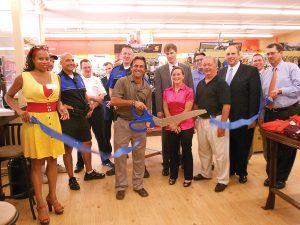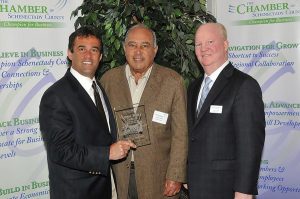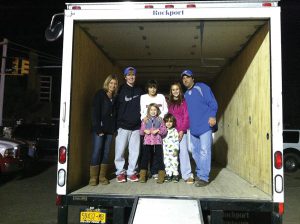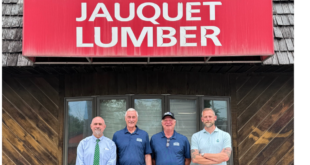To view a PDF of this story, click here.
By Kate Klein, kklein@nrha.org
Continuing a Legacy of Kindness
A fire on Christmas Day destroyed a Phillips Hardware employee’s apartment building, and his co-workers were quick to help.
The staff from the Waterford, New York, store used social media to let customers know the 18-year-old employee’s family had lost everything. They asked for donations of money, blankets and clothing.
The family needed to pay a deposit and rent for a new apartment and buy groceries, gasoline and medicine.
Within two weeks, the employees had raised about $3,500, and stockpiled supplies for the family at the store.
That prompt action and generosity reflect what owner Jon Phillips believes makes his 131-year-old business successful.
“My passion is social work. It’s service,” Jon Phillips says. “The business is a means of doing what my real passion is.”

He encourages his employees to be community servants, not just people who do their work and go home with paychecks, he says. He strives to create that service culture in all five of his stores, which are located in Altamont, Delmar, Schenectady, Voorheesville and Waterford, New York.
That doesn’t mean Jon isn’t an ambitious businessman, but he has more dominant priorities. Prioritizing public service is his hallmark, and he is building on a family legacy of kindness.
“Our philosophy has really been to help whoever we can help,” Jon’s father, Abbott Phillips, says.
Customers remember Abbott’s father, who owned the business before him, for his kindness. “People say, ‘Your father was a real gentleman,’” Abbott says. “That’s what our inheritance is.”
Building an even stronger serving culture reflects Jon’s personality and values, which have helped shape the company since he joined it in 1991.
“At this point in my life, it’s most important how my kids view me and how my community views me,” Jon says. “It’s more about the social impact.”
Successful for Over a Century
Jon has mostly bought out his father’s stake in the family business, but Abbott still works and talks to him daily about how operations are going.
“Whatever he suggests, I basically agree with him,” Abbott says. “As good as I thought I was at his age, I believe he’s 10 times better than I was.”
Abbott has supported the many changes his son has led, including switching hardware cooperatives three times and updating the company’s business model.

“He’s asking, ‘Where are we going? That’s cool. Have you thought about this?’” Jon says of his father. “He’s excited to see where I take the company next to bring his grandchildren in.”
Phillips Hardware has survived two world wars, the Great Depression, recessions and the entrance of big-box businesses like Home Depot and Lowe’s.
Adaptation over more than a century has kept the business successful over time, with people coming first and sales staying secondary.
“A lot of people in the community respect us, respect the business,” Jon says. “You do business for the right reason and hope you earn the right income.”
Jon is the fifth-generation owner of the company, which his great-great grandfather Teddy Phillips started in 1886 after emigrating from Russia to the U.S. The Phillips family’s first store started out as a locksmith shop that also sold parts for steam-powered machinery.
By the 1920s, Phillips Hardware focused more on hardware merchandise and still offered locksmith services. In the 1970s and 1980s, Abbott led the company’s expansion into multiple locations. He bought out other local hardware store owners to grow the company.

his business.
Now, Jon is diversifying the company with other businesses. For example, Phillips Hardware now owns mixed-use buildings that house hardware stores as well as other tenants. And he is working toward constructing a sports facility for activities such as indoor soccer.
Jon is also designing the first ground-up Phillips Hardware location, which will feature the company’s first gas station.
“In 26 years, I’ve never gotten to build what I want a store to be,” Jon says. “It will have a Phillips Hardware museum, but also have a flavor of it being modernized and a cool place to shop for this day and age.”
He’s also always looking for ways to improve the existing stores, and has expanded niche product areas, such as Carhartt clothing and Stihl power tools.
Abbott supports Jon’s approach to giving generously without monetary gain in mind, valuing family and emphasizing business adaptation. Abbott also believes in keeping promises to customers, even if doing so might lose the business some money, he says.
Those family values have earned the company respect and loyal shoppers, Abbott says.
A Serving Culture
In addition to running the business and planning ways to expand and diversify, Jon keeps a crammed schedule of volunteer activities. He leads by example when he encourages employees to serve their communities. He coaches multiple children’s sports teams and is active in his local chamber of commerce. He has also poured money and volunteer time into organizations, including Children’s Miracle Network Hospitals, the Boys & Girls Clubs of America and a sports program for injured military veterans and special needs athletes.
In addition, Jon works with local police departments to build relationships with urban teens and teach them basic skills to help them find jobs. He conducts practice job interviews with the teens and reinforces the importance of simple things like a firm handshake and eye contact.
He also takes the children’s sports teams he coaches out volunteering, encouraging them to help with Special Olympics events and run the bases with special needs baseball teams.
The Next Generation
Jon thinks each of his five children may end up bringing unique skillsets back to the business, after they have first gone out into the world to try other careers. His kids range in age from 8 to 21.

All of them have shown interest in Phillips Hardware, but Jon isn’t pushing any of them to commit to taking over when he’s ready to retire.
“If you don’t push things, it’s more natural,” he says. “I don’t want to make them be me. I wasn’t my father. I grew the company because I had a community mindset. I want to open my kids up to other avenues. If they bring back other things to our business, it will help us stay around for another generation.”
 Hardware Retailing The Industry's Source for Insights and Information
Hardware Retailing The Industry's Source for Insights and Information








